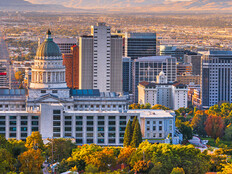Cities Vie for $40 Million in Smart City Challenge
Cities from every corner of the United States applied to the Transportation Department’s Smart City Challenge, which will award one municipality $40 million to implement a data-driven idea aimed at making transportation safer and more reliable.
In total, 77 cities from 34 states — ranging in size from metropolises such as Atlanta and Seattle to smaller locales such as New Haven, Conn., and Port Huron, Mich. — have submitted applications for the contest.
“We are very impressed by the response by community leaders across the country,” Transportation Secretary Anthony Foxx said in a statement. “Cities understand that in order to plan for tomorrow, they need to embrace technology and innovation. This challenge is going to do more than just help one city adopt innovative ideas. Instead, it will serve as a catalyst for widespread change in communities across America.”
The agency issued the challenge in December, as a follow-up to its February 2015 report “Beyond Traffic,” which outlines the infrastructure challenges facing the nation.
Cities had until Feb. 4 to submit proposals that focus on how innovations in technology, including automated vehicles, can be used to create an intelligent transportation system. By emphasizing technology, connectivity and data-driven platforms, the competition is seeking out designs for a futuristic transportation system that can be replicated in other municipalities.
The department will name five finalists on March 12 at SXSW in Austin, Texas. Each finalist will receive $100,000 to develop applications for the final selection process in June.
Along with bringing home the agency funds, the winning city will receive another $10 million from Vulcan Inc. (owned by Microsoft co-founder Paul Allen) to increase the use of electric vehicles and to implement other steps to reduce carbon emissions.
Louisville, Ky., was one of several challenge hopefuls that posted their application online. Having started with a handful of smart-city initiatives three years ago as part of its Imagine Louisville campaign, the metropolis highlighted a number of new transportation measures, including a smart-lane pilot program, information leveraging and urban automation.
“We have built a society, reflected in the design and operation of our mid-sized cities, around the assumption that everyone will have a car and will use it for the vast majority of their transportation needs,” Louisville states in its application. “As a result, everyone who can afford a car feels compelled to have one, and everyone who cannot afford a car (or who cannot drive) is placed at a severe disadvantage, with significant negative impacts on quality of life.” As the “Beyond Traffic” report notes, our transportation infrastructure was not designed to support a rapidly growing population and people’s need for more ways to get around. With this contest, the department hopes to change that paradigm.
Read more about the Transportation Department’s Smart City Challenge here, and view the list of cities that applied for the grant funds.








